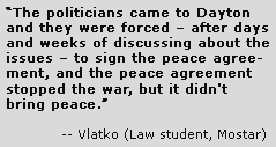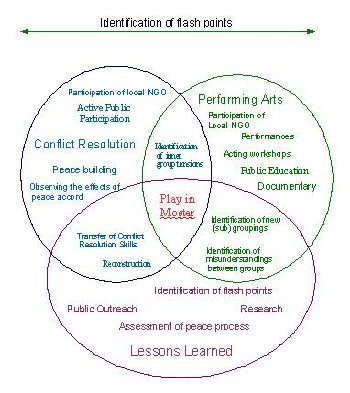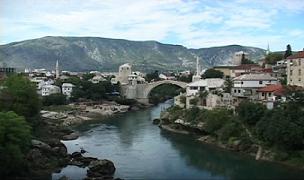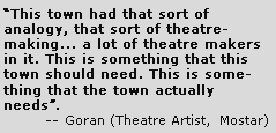PROJECTS
Ongoing
Archive
The Dialogues Project: Bridging
People and Identities

Project Overview
The project is lead by the Canadian International Institute of
Applied Negotiation (CIIAN), in collaboration with the Canadian
Institute for Conflict Resolution (CICR), Modern Times Stage Company,
Production Jeux d'ombres, and OKC Abrasević.
“The Dialogues Project” is a
unique combination of theatre, conflict resolution mediation,
documentary production and research. The focal point of the project is
the production of the play “Aurash”. “Aurash” a
contemporary play by celebrated Iranian playwright, historian and
filmmaker, Bahram Beyza'i, is based on a 1000 year-old Persian myth
about a heroic archer, Aurash, whose skills rescues Persia from
destruction. For centuries, the myth remained a seminal story of
nationalism and pride for the Persian
people. In the 1970s, Beyza'i revamped the fable, taking an ironical
look at its nationalism, and infusing it with strong humanist and
pacifist themes.In conjunction with Mostar partner OKC
Abrasević, the play will be cast with local citizens, professionals and
non-professionals from various ethnic backgrounds, ages, and genders.
Performances will be held in the city of Mostar, Bosnia and Herzegovina
in the spring of 2009.
Rationale
Social groups
within Mostar are still divided, fighting a war without bullets. The
city is now one of the key areas where success or failure of long-term
stability in the region will be determined. Monitoring the long-term
application of the peace process is vital to overall security and
reconstruction efforts. Peace building is not merely the absence of
violence—it is the presence of durable formal and informal
conflict mediation and resolution mechanisms. The formal state
structures such as the legal system are being strengthened, but the
informal networks of volunteers, family and neighbourhoods are being
neglected. Without support for these groups, a vibrant civil society, a
democratic and accountable government, and formal education and health
sectors remains impossible.

The Dialogues Project focuses on these informal segments of
society—it is rooted in the notion that reconciliation and peace
is obtained through dialogue, and dialogue is at the core of theatre.
Through careful selection of local actors from an array of ethnic and
religious backgrounds, representing both genders and various age
groups, Aurash provides the actors and the audience the opportunity to
explore how identity and conflict interact. It affords them an
opportunity to ponder how their own perception of identity impacts
their daily lives. The presence of professional conflict mediators will
facilitate constructive communications between all parties.
 The Dialogues
Project Video (WMV Movie) - A short movie on
the development of the project. The Dialogues
Project Video (WMV Movie) - A short movie on
the development of the project.
Research Papers
|
For academics with proposals for
research, please contact 'The Dialogues Project' Research Coordinator
Roger Hill by way of project coordinator Renée
Gendron.
Identity is a fundamental component
to many conflicts. Identity can be manipulated to mobilize and
militarize populations and push them towards conflict. When used
negatively, identity serves to demarcate groups, heightening
differences while downplaying similarities, common struggles, and
shared achievements.
The cast of actors will be selected
from the local population. They will be selected for their acting
abilities and will represent the ethnic composition of the city of
Mostar.
Leading academics from the fields of conflict resolution and conflict
mediation will be selected to
participate. The research will focus on how the actors interact with
one another and how stereotypes (both negative and positive) influence  a
person's perception of the 'other'. Moreover,
the research will assess the degree of ethnic and social cleavage in
present day Mostar and how these social divides
impact the overall peace process. From these observations,
policy makers, analysts, mediators,
civil servants, researchers, and members of the public will be able to
better ascertain the current obstacles for peacemaking in the city and country. a
person's perception of the 'other'. Moreover,
the research will assess the degree of ethnic and social cleavage in
present day Mostar and how these social divides
impact the overall peace process. From these observations,
policy makers, analysts, mediators,
civil servants, researchers, and members of the public will be able to
better ascertain the current obstacles for peacemaking in the city and country.
|
 |
The Documentary
A documentary film is to be made on the
theatre rehearsals and production that promises to disseminate the
results of the project to the general public and institutions of
research, as well as provide pertinent interview material for
researchers. A feature-length documentary will be made as well as
hour-long versions for Canadian and European markets. Furthermore, a
series of shorter educational videos will be created for specific
pedagogical purposes.
About Aurash
In the original myth “Aurash”, the hero releases
an arrow that travels three days and nights to land in a far away
walnut tree, thus defining a vast new land of Persia. In Bahram
Beyza'i's version, Aurash, a native of and humble stable hand, becomes
an unwilling player in his country's post-war border treaty, with very
different results.
The story is set in Persia, in a time when
the country is on the brink of annihilation. The conquering country
lays down the terms of surrender: an arrow must be released from
Persia's highest mountain peak and wherever it lands, the new borders
will be drawn. At a loss to find a willing saviour for his country, the
Persian Commander decides to send an envoy to plead for more time.
Aurash, a humble stable hand, is selected, as he is the only one who
speaks the enemy's language.
Aurash travels to meet the conquering King
of Turan. The wry and cruel king grants a reprieve, but with one small
condition... Aurash must be the archer. Returning to Persia, Aurash
finds the news of the arrangements has preceded him. The country's
wrath falls on Aurash: he is beaten, and his name is cursed on every
tongue.
Aurash laments his fate, but in the end decides to fulfill his
role as the national “hero”. He begins his difficult and
lonely ascent up Mount Elborz. His struggle is as much philosophical as
it is physical: he seeks answers from his father's ghost, his shadow
and Mount Elborz herself. But he finds himself neither solace, nor
companionship on his path, and he arrives at the summit accompanied
only by a raging heart. Summoning all his soul, he releases the arrow
to the heavens.
The arrow sails away... never to land.
To this day it is said that Persians remain at the foot of the
Elborz waiting for the arrow to fall to earth, and for their hero to
return.
The City of Mostar

The city of Mostar was the principal Turkish administrative
centre of the Herzegovina region during the sixteenth century. Mostar
is on the Neretva River. Mostar derives its name from the stone bridge,
the Stari Most, that spans its banks. It was transferred to Austria in
1878 and then Yugoslavia after the Second World War. Mostar was a
significant commercial centre in Bosnia-Herzegovina. It produced
tobacco, aluminium, bauxite and wine. There is also a hydroelectric
plant nearby.
During the Bosnian War, Mostar was under siege for eighteen
months. The army of Bosnia-Herzegovina allied with the Croatian Defence
Council. Together they successfully repelled the Yugoslav's People's
Army attacks. Once the siege had lifted, the city was divided into two
camps. West Mostar, was run by the Army of the Republic of Croatia, and
East Mostar was run by the Bosnian government. The bridge built in 1566
by the Ottomans, was destroyed in 1993. The destruction of a historical
landmark not only divided the city in two, it left deep social wounds.
 The 1995 Dayton
Accords brought the conflict to an end. The Organization for Security
and Co-operation in Europe initiated a mission in Bosnia-Herzegovina
with specific emphasis on the rule of law, good governance and the
protection of human rights. The 1995 Dayton
Accords brought the conflict to an end. The Organization for Security
and Co-operation in Europe initiated a mission in Bosnia-Herzegovina
with specific emphasis on the rule of law, good governance and the
protection of human rights.
The situation in Mostar to this day remains strained. The
destruction of the bridge visualized the deep social chasms of the
city. Although the bridge has since been rebuilt, the trust between the
various communities in Mostar remains damaged.
Project Objectives
- Produce a beautiful play for the residents of Mostar
(4 performances)
- Produce a documentary that explores the experience of
creating and producing the play, looking at the role of identity and
ideology in present day Bosnia and Herzegovina.

- Provide mediation for the actors
- Provide lessons learned from project and assess the
current stressors to peacebuilding efforts. Publish results of findings.
- Create educational videos for Canadian and European
audiences
Project Participants
Soheil
Parsa is an award-winning Iranian-Canadian theatre director.
In 1995, Soheil received the New Pioneers Award by Skills for Change
for Outstanding Contribution to the Arts by a recent immigrant to
Canada. He has received four Dora Mavor Moore awards as well as a
Chalmers Fellowship. Soheil is the co-founder of the Modern
Times Stage Company (based in Toronto),
known for its daring, highly imagistic productions of international
themes. Soheil will be the director of the play.
Vesna
Dasović-Marković will serve as mediation specialist during
the project. Vesna received her law degree from the University of
Belgrade. She was a judge in Bosnia and Herzegovina. Her knowledge of
the criminal justice system provided Vesna with unique qualities that
enabled her to train over 300 hundred judges in mediation in Bosnia and
Herzegovina, Serbia and Montenegro and Macedonia. She is an Honoured
Fellow of the Canadian Institute for Conflict Resolution (CICR). Among
her many accomplishments, Vesna was the country director and lead
trainer and mediator providing Third Party Neutral (TPN) courses in a
community-based conflict resolution project coordinated by the CICR.
Vesna is a member of the Ontario Mandatory Mediation Program (OMMP) and
the Association of Mediators in Bosnia and Herzegovina. She has
mediated and co-mediated in over 200 cases. She has prepared the
Evaluation Report on the “Introduction of Mediation in Banja Luka
Basic Course Pilot Project.
Peter
Farbridge will direct the documentary. He
collaborates with the film production house Productions Jeux
d’ombres, and has directed two documentary films, “Change
From Within” and “Not an
Extra”. Peter has a diverse background in theatre production,
acting, directing and writing.
Dr.Ben
Hoffman is contributing his expertise in conflict resolution
to the project. He is Director of the International Peace and
Prosperity Project (IPPP). Ben was recently a Visiting Scholar at the
University of Victoria. He directed the Conflict Resolution Program at
the Carter Center in Atlanta, Georgia. He is President and was a
co-founder of the Canadian International Institute of Applied
Negotiation. He received his Masters in Psychology from Wilfred Laurier
University and a second Masters in International Relations from The
Fletcher School of Law and Diplomacy at Tufts University, a
Specialization in International Peacekeeping from Harvard and a PhD
from York University, Great Britain.
Brian
Strom is contributing his expertise in conflict resolution
to the project. He is the Executive Director of the Canadian Institute
for Conflict Resolution. He worked for 23 years at the Farm Credit
Corporation. The last eight years of his time at the Farm Credit
Corporation, Brian was Senior Vice-President. Brian has been involved
in the field of conflict resolution for the past 12 years, in the
private as well as public sector. He is a member of the Civilian Peace
Service Working Group.
Roger Hill is a Senior
Associate of the Canadian International Institute of Applied
Negotiation (CIIAN), Roger Hill is an international affairs specialist
now focusing on conflict resolution and peacebuilding. With extensive
experience in multilateral diplomacy, advice to parliament, university
teaching and research, he has served as Political Advisor with a major
international organization, Deputy Director of a group advising
parliamentary committees, and Research Director of a government peace
and security institute. He has served as advisor to Canadian
delegations at more than thirty international conferences. Affiliated
with CIIAN over the last decade, he has carried out a multi-year study
on the use of Alternative Dispute Resolution (ADR) and other conflict
resolution techniques in the world’s conflict situations,
as well as work on Cyprus, Balkan issues, and Indian Land Claims in
Canada.
Contact Information
LEAD ORGANIZATION
Canadian International Institute
of Applied Negotiation (President: Dr. Ben Hoffman)
PARTNERS
Canadian Institute of
Conflict Resolution (CICR) (Executive Director Brian Strom)
Modern Times
Stage Company (Coordinator: Sue Balint)
Productions Jeux
d’ombres (Documentary Producer: Anne-Marie Gélinas)
OKC Abrasević (Media Coordinator: Husein Orucevi)
For all
information concerning The Dialogues Project please contact the Project
Coordinator: Renée
Gendron
|



